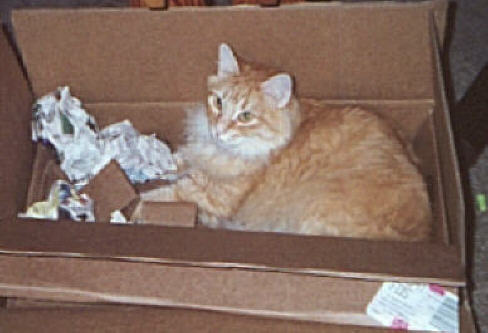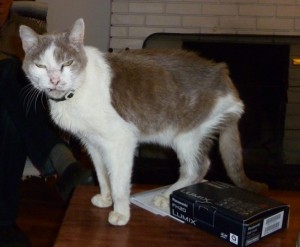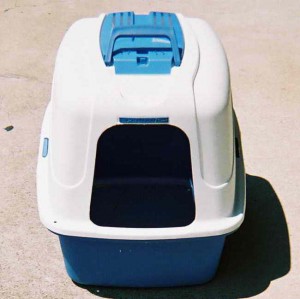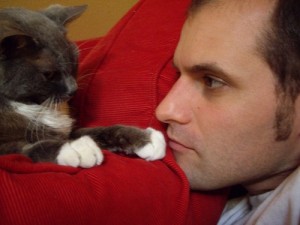Natural Death for Cats: Letting Go
July 11th, 2010
Rocky in his younger years
About 4 years ago, my cat Rocky was euthanized after about 2 years and $20K worth of veterinary visits, hospital stays, expensive tests, injections, pills, liquids, special food, vitamins, and subcutaneous fluids. I didn’t realize at the time that it would add up to so much effort and money just to have the same end result. Every new treatment came with the promise of “fixing” him. It always seemed as though if we could just get past this one thing, he’d be back to normal. Whatever “normal” had become.
In retrospect, I realize that every new treatment brought with it a new set of side effects and problems and none got to the heart of the problem. And every new test seemed to come back with a similar inconclusive result: “It could be [some innocuous problem] or it could be cancer. We’ll try some Clavamox.” It was so predictable that it became a running joke in my household.
After Rocky died, I changed my whole approach to veterinary care for my remaining 2 cats and dog, all of whom by this time were fairly elderly for their species. I have followed 3 new rules fairly religiously:
- If he isn’t bleeding or in pain, he doesn’t go to the vet.
- If the treatment offered will not fix the problem, but will only mask some symptoms for a while, I won’t do it.
- If the expensive test offered only has the potential to find a problem that can’t reasonably be cured, I won’t bother getting the test.
About 2 years ago, my beloved cat Gregory started losing weight. He had always been 11-12 pounds (and not overweight) and now he was down to 9. Then closer to 8. After a couple of vet visits I was already starting to see the familiar pattern at the vet’s office emerge. “It might be diabetes, cancer, or maybe just an infection. We could run some tests…..” I had the basic blood tests done, to make sure there was no immediate danger. There wasn’t. The vets, as usual, could not tell me why he was losing weight. They offered various tests that each cost between $300 and $500. All the same tests I’d had done on Rocky that always produced inconclusive results.
By this time, Gregory was at least 14 years old (true age unknown but I took him in as an adult cat in 1995). I accepted that he was a very old cat and would die one day soon, as we all do. I reminded myself of my 3 rules, and resolved to buy him the best food, and give him absolutely the best life I could give him for the time he had left. As it turns out, that time lasted until July 8, 2010 at 4:12pm. Last Thursday.
His quality of life was very high up until maybe a month before. He became quite thin and his back legs were getting wobbly and weak. He suddenly began drooling when he drank water and rather gross-looking saliva was pouring into his water bowl. At that point, I brought him to the vet, thinking he might have an infection in his mouth that could be “fixed” so that he could continue on a little longer. The vets found nothing conclusive, but gave him Clavamox anyway thinking he might have a gum or tooth infection. His teeth really needed to be cleaned but he was too weak to be anesthetized for the cleaning. Gregory continued on with his happy life even with the drooling and the muscle weakness.
Last Thursday, at the age of (at least) 16, he quite suddenly took a dramatic turn for the worse. He was so weak he couldn’t walk without falling over. He drank and ate a little bit, but mostly could only lay on his bed. I assumed (hoped) that this was the day he would let go, since his quality of life was seemingly gone. I spent the day with him, scratching his chin and listening to him purr. I helped him get to the litterbox or readjust his position when he struggled to get up. I fought the urge to take him to the vet, determined not to make him spend his last day on Earth in an uncomfortable and unfamiliar place with strangers. After a long day of waiting, Gregory began to get a bit fitful, pushing his paws against some force that I couldn’t see – this lasted for several minutes. Then he calmed down, took several very deep breaths, and then died.
Just like with Rocky, Gregory lived about 2 years after his health began to decline. But unlike Rocky, he wasn’t burdened with hospital stays, poking and prodding, and side effects. Vet care for his final 2 years was under $1000. I would have happily paid $20K if it would have fixed him, but I don’t believe it would have. You can’t fix mortality.
Do I have any regrets? Yes, I do have one. I wish I had gotten Gregory’s teeth cleaned again while he was still well enough to handle it. I worry that his tooth and gum issues hastened his decline and made his life a little less enjoyable. That is the only one though. Gregory was just about the luckiest cat in the world. Spoiled, happy, and truly loved by many many people.


![[del.icio.us]](https://www.vegangirl.com/wp-content/plugins/bookmarkify/delicious.png)
![[Digg]](https://www.vegangirl.com/wp-content/plugins/bookmarkify/digg.png)
![[Facebook]](https://www.vegangirl.com/wp-content/plugins/bookmarkify/facebook.png)
![[Google]](https://www.vegangirl.com/wp-content/plugins/bookmarkify/google.png)
![[Ma.gnolia]](https://www.vegangirl.com/wp-content/plugins/bookmarkify/magnolia.png)
![[MySpace]](https://www.vegangirl.com/wp-content/plugins/bookmarkify/myspace.png)
![[Reddit]](https://www.vegangirl.com/wp-content/plugins/bookmarkify/reddit.png)
![[StumbleUpon]](https://www.vegangirl.com/wp-content/plugins/bookmarkify/stumbleupon.png)
![[Technorati]](https://www.vegangirl.com/wp-content/plugins/bookmarkify/technorati.png)
![[Twitter]](https://www.vegangirl.com/wp-content/plugins/bookmarkify/twitter.png)
![[Yahoo!]](https://www.vegangirl.com/wp-content/plugins/bookmarkify/yahoo.png)
![[Email]](https://www.vegangirl.com/wp-content/plugins/bookmarkify/email.png)






